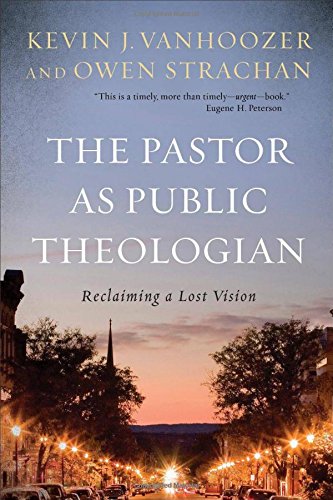Reviewed by Andrew J. Spencer
The contemporary age is one of information and ideas. Fragments of philosophy and theology are tossed about on the internet like so much flotsam waiting to wash up on the nearest shore to be viewed, collected, or cast back onto the water. Social media enables ready access to a potpourri of concepts united only by the medium on which they are transmitted, though not in the message they proclaim. This dis-integrated condition of information in the world is a major reason why the call for local church pastors to practice and proclaim their theology publicly is timely. This makes the recent volume by Kevin Vanhoozer and Owen Strachan, The Pastor as Public Theologian: Reclaiming a Lost Vision, particularly valuable.
The volume begins with an introduction by Vanhoozer. He argues that the vision of the pastor-theologian has been displaced by the idea of the pastor as manager. In place of this the pastor should reclaim the position as the thought leader for the local church and congregations should be prepared to support that role. In Chapter One, Strachan surveys the biblical data about leaders of the people of God through Scripture. He notes that there is a consistent emphasis on the spiritual and theological roles of leaders in Scripture, although there are differences in the purposes of prophets, priests, and kings. In the second chapter, Strachan turns from the pages of Scripture to an overview of Church history. Again, history reveals that the leading thinkers throughout history, until recent years, have been churchmen not professional theologians. These first two chapters make a strong case that leaders of the people of God have publicly held a distinctly theological role.
In the second part of the volume, Vanhoozer examines the idea of the pastor-theologian through a distinctly theological lens. Chapter Three focuses on the question through Systematic Theology. The pastor-theologian should be doing theology in a way that offers a ministry of the reality of Christianity, provides the means for understanding the truths of Scripture, and offers ethical instructions drawn from those foundations. The fourth chapter is Vanhoozer’s examination of the practical functions of the pastor-theologian. Sound theology done publicly should enable the pastor to build disciples, be an evangelist, catechize his congregation, design and lead worship, and engage (to some degree) the world through apologetics. These functions are consistent with the historic vision of the pastor; they are encouraged through the exercise of the theological role of the pastor. The book concludes with a chapter presenting fifty-five theses about the pastor-theologian in summary form. If you have only a few minutes to read this book, read the last chapter.
Throughout the volume there are short testimonies and exhortations from pastors who are doing theology in the local church context. These interludes give support for the arguments of the volume. They affirm the possibility of doing theology from the local church and describe how it can be done. Additionally, by including the voices of practicing pastors, the weakness of a volume on this topic written by professional theologians is significantly diminished. This book is targeted for pastors (and congregations with pastors) who are theologically trained and have, at least in some measure, the skill set to do formal theology. It may have exceeded the scope of this book, but information that would help a pastor without a theological education become equipped to be a pastor-theologian is missing from this volume. Perhaps another edition or a related volume can fill that need.
Vanhoozer and Strachan present a model of the pastor-theologian that is realistic. The local pastor will not do formal, academic theology in the same manner as a professor at a seminary or university. To expect that would be unreasonable and diminish the ability of the pastor to shepherd his congregation. A church leader, however, should think theologically and study with a mind to increasing the knowledge of his congregation, providing them with the intellectual framework to sift through and evaluate the jetsam of ideas that washes up at their feet from the internet. The shepherd serves his congregation by ministering to their daily needs and comforting them through sorrows as well as by helping them to become better thinkers and showing them how theology is done. There is a dual role. Because of the accessibility of information, the theological function of the pastor has perhaps never been as significant as before.
The need for the revival of the pastor-theologian role is great. Vanhoozer and Strachan have done the Church a service by presenting a reasonable vision for integrating practical ministry with the life of the mind and its significance in the present age. This is a volume that should be read by seminary faculty and administrators and used to shape their curriculum. It should find its way into the hands of many students at seminaries and Bible colleges. Additionally, lay leaders in churches should read and consider the vision presented in this book so they can advocate for the provision of the necessary resources for their local pastor to fulfill both a practical and intellectual role within the congregation. Finally, it should be read by pastors as a call to do the hard work of thinking theologically in order to equip the saints for the good works prepared in advance for them by God.
Andrew J. Spencer is Director of Assessment and Institutional Research, Oklahoma Baptist University, Shawnee, OK.
